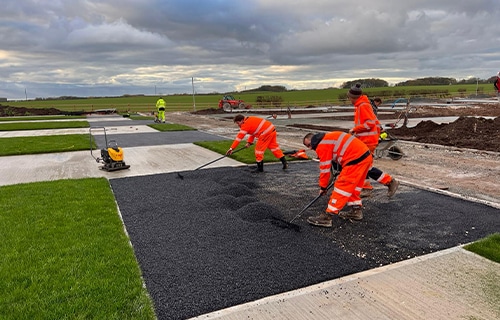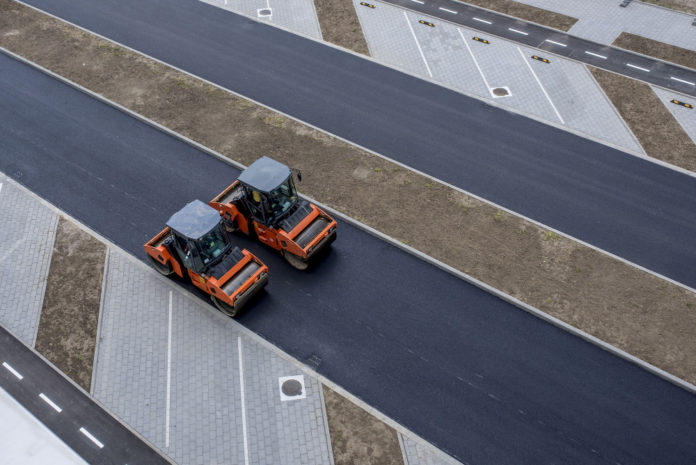No matter whether it is a new car park or a refurbishment carpark surfacing project, waterproofing solutions provide effective protection from the elements for top decks, ground-bearing decks, intermediate decks, and ramps.
Tarmac (also known as bituminous macadam) is an affordable surface parking solution that requires minimal upkeep.

Tarmac
Tarmac is the go-to material for car park surfaces due to its durability and affordability compared to other options. Plus, its installation costs can be kept down by covering existing surfaces, which reduces installation times while minimising disruption to your business. Plus, it works perfectly fine on various surface types, including asphalt pavements and roads!
While tarmacadam can be resilient, it can still be vulnerable to damage from diesel or gasoline spillages, which may cause its bitumen to melt or dissolve when exposed to these chemicals. Weed growth also poses an imminent threat, making removal more challenging once established on its surface.
SMA (Stone Mastic Asphalt) is an alternative form of tarmacadam that features fewer external materials and lasts longer. It can be used to create hardwearing car parking surfaces capable of withstanding heavy vehicles and high volumes of traffic, and it is even suitable for heritage sites due to its ability to blend in seamlessly.
Resin-bound parking lot surfaces are increasingly popular choices due to their attractive, stony appearance. Resin-bound can be installed over existing asphalt or concrete surfaces for an easily customizable look without breaking the bank. Furthermore, resin-bound is permeable, allowing water drainage away from your car park, helping avoid flooding or ice buildup during the winter months and ensuring no flooding issues arise.
LC Surfacing offers a comprehensive suite of carpark surfacing services, from site preparation and utility laying through to the construction or resurfacing of your parking area. From domestic driveways to large multi-story car parks, our experienced staff has everything needed for success. Contact us now to discover more! We provide free quotes and can arrange visits directly to your property so we can discuss all available options with you. Reach out now for a consultation visit and more information!
Asphalt
Asphalt is an ideal surface material for car parks, as it is both durable and easily repairable, making repairs quick and maintenance simple. Furthermore, its smooth appearance demonstrates your commitment to aesthetics on your property. Installation takes only 48 hours with strong waterproof protection against heavy vehicles parked nearby.
Asphalt’s environmental friendliness is another benefit. Producing it does not require much energy and reduces emissions of toxic fumes and pollutants.
Asphalt differs from concrete in that it can be laid in layers without being affected by changing temperatures or freezing weather, making it ideal for areas prone to snow and ice accumulation, as this prevents its accumulation, which could otherwise crack the surface. Furthermore, it won’t be damaged by salt used on parking lots during the winter to melt snow and ice off their surfaces.
Before the asphalt can be laid on an existing surface, the existing surface must first be prepared by compacting any debris, roots, or rocks; clearing away any frost; and making sure structures like pipes or wires can move freely before beginning paving operations.
The initial asphalt layer to be laid over the prepared subgrade and compacted is known as the base course and must meet certain thickness specifications before compacting to achieve its full thickness. A spray-applied emulsified asphalt tack coat may then be added as the second layer, followed by a levelling course that acts to correct surface irregularities and any irregularities in their own right.
The surface course serves as the riding surface for vehicles and should be applied over the tamped base course. Up to 30% grit may be added to this layer in order to increase its hardness and meet the demands of vehicles driving on it.
Resin-bound
Resin-bound paving is a popular choice for driveways and patios, but it also makes an excellent addition to car parks. Permeable resin-bound surfaces allow water to quickly drain back into its source, helping reduce flood risk while also helping prevent ponding or surface run-off. Plus, resin-bound surfaces are resistant to weeds, mould, maintenance costs, and slipperiness, making driving safer!
Resin-bound paving is created by binding natural aggregates together with resin to form an attractive yet hard-wearing surface that’s suitable for pedestrians and vehicles alike. Available in an array of colours to match your business branding or complement the landscape, HMS uses eco-friendly, locally sourced aggregates that produce stunning results while fitting seamlessly into their surroundings—even adding logos or designs into the resin for a truly personalised car park surface that’s sure to impress guests visiting your business!
Before applying resin, it is critical to properly prepare the base. This requires keeping it free from organic matter that could harm it; cleaning with sweeping, power washing, or vacuuming as soon as the resin has been applied will remove debris and oils; once applied, it can be hand trowelled for even coverage before aggregate is spread over it immediately before curing begins.
The use of high-quality aggregate tested to BS 8204-6:2008+A1:2010 Appendix B standards and compliant with SuDS guidelines is of utmost importance when installing any surface, particularly pedestrian areas that will require 4-5kg and 6–8 kg/m2, respectively. Furthermore, covers should be removed or lifted prior to beginning installations in order to minimise contamination issues with new surfaces.
As with tarmac, it’s essential to check weather conditions prior to installing a resin-bound surface. Rain and wind can negatively impact the resin; therefore, it is recommended to install this surface when conditions are calm and dry.
Gravel
Gravel car parks provide an economical, quick, and eco-friendly alternative to asphalt or concrete car parks, making installation quick and simple while protecting the environment. Their loose texture can look particularly pleasing at heritage sites. Furthermore, gravel lays easily, even on uneven ground. Unfortunately, though, gravel doesn’t resist weed growth and will require regular sweeping as well as the occasional application of weed killer to maintain an attractive appearance, typically through regular sweeping or spraying with weed killer.
Asphalt provides a tougher surface that resists cracking and wear when used with HGVs, making it more durable than gravel and relatively cheaper than concrete. Line markings are easy to see due to asphalt’s dark hue, and rainwater runs off easily from its surface, causing issues for stormwater management systems. However, asphalt does not permeate, as rainwater runs off without percolation into groundwater systems and causes disruption.
Permeable paving solutions provide an eco-friendly surface that drains naturally while accommodating various vehicles, like cars, vans, trucks, and coaches. Porous plastic grids such as the PP25 or PP40 porous plastic paving grids make these permeable surfaces suitable for such projects as they allow gravel to remain contained while still offering strong support structures suitable for cars, vans, trucks, and coaches alike. When combined with SuDS (Sustainable Urban Drainage System), attenuation solutions like gravel car parks can become viable long-term solutions used year-round!
Consider sustainable and eco-friendly options when selecting surfaces for commercial parking areas to help lower both initial installation and ongoing maintenance costs. Consider SurePave Gravel and SurePave Grass with both PP25 and PP40 porous paver grids to reduce initial installation and ongoing maintenance expenses, with an array of colours to make these permeable surfacing options even more enticing to customers and employees while saving you money over time.




